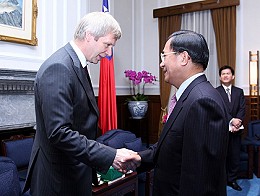News & activities
 News releases
News releases

President Chen Shui-bian on November 16 met with World Medical Association President Dr. Jon Snaedal and his wife at the Presidential Office. President Chen extended a warm welcome to the couple on their visit to Taiwan and also expressed his appreciation for the suggestions made by Dr. Snaedal regarding health and medicine on Taiwan.
The president said Dr. Snaedal is the most influential person in the medical community in Iceland. In September last year, he provided a warm reception to Chairman Wu Shuh-min of the Foundation of Medical Professionals Alliance in Taiwan. He then accepted an invitation extended by Chairman Wu to visit Taiwan, which is a great honor for Taiwan.
President Chen said he appreciated the concern and support expressed by Dr. Snaedal for Taiwan's participation in the World Health Organization (WHO). The president stressed that the people of Taiwan believe the world knows no boundaries in health, medicine and disease prevention. The right to health is a basic universal right that should be shared by people throughout the world, he said. Meanwhile, the right to health for the 23 million people of Taiwan should not be restricted or denied. He said Taiwan has sought for 11 consecutive years to obtain observer status at the World Health Assembly (WHA), with the hope of having meaningful participation in WHO-related activities. The president said this year was the first year Taiwan applied to become a member of the WHO under the name "Taiwan." Entry into the body under the name "Taiwan" is the desire of the people of Taiwan, and the president said he hopes that Dr. Snaedal will use his influence to lend assistance to Taiwan in this regard.
President Chen said many parliaments in European nations, as well as the European Parliament, have expressed support for Taiwan to be granted observer status in the WHA. Even the US Congress supports Taiwan's efforts to become an observer. In 2004, the United States, Japan and other countries not maintaining formal diplomatic relations with Taiwan voted in favor of observer status for Taiwan. In 2005, the US and European nations for the first time made a motion supporting meaningful participation for Taiwan in WHO-related technical activities and conferences. The WHO secretariat, however, in July 2005 signed a secret memorandum of understanding with China's Ministry of Health, changing any meaningful participation for Taiwan into non-meaningful participation. This development was regrettable, the president said.
President Chen stressed that given Taiwan's achievements in the areas of health, medicine and disease prevention, people throughout the world lose out as the result of Taiwan not being admitted as a formal member of the WHO. He said this also constitutes a black hole and gap in the world's disease prevention network, which is not in the interest of mankind. Given the close relationship between the World Medical Association and the WHO, the president said he hopes Dr. Snaedal will lend his assistance in helping Taiwan to actively participate in the WHO.
Dr. Snaedal said he agreed with President Chen's statements and understands the importance of Taiwan's entry into the WHO. He also said he believes that the rejection of Taiwan's participation in the organization is not Taiwan's problem, but rather the world's problem. Dr. Snaedal said the World Medical Association has passed three motions urging the WHO to allow Taiwan to become an observer in the WHA.


